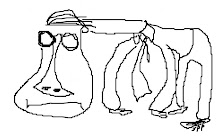 Faithful reader lupner has made a special request for a word about silent film star Marie Prevost. So here's the word:
Faithful reader lupner has made a special request for a word about silent film star Marie Prevost. So here's the word:Canadian-born Marie Prevost got her start with legendary comedy film producer Mack Sennett in 1915. In 1921, she came to the attention of a young producer at Universal by the name of Irving Thalberg, who decided she had the makings of a star. Known primarily as a light comic actress, she probably did her best work in a trio of Ernst Lubitsch vehicles, The Marriage Circle, Three Women and Kiss Me Again.
Although she continued to appear in movies throughout the 1930s, Prevost's career took a sudden nosedive with the advent of sound and she began slipping down the billing until she was reduced to playing uncredited bit parts.
A heavy drinker since the silent days, Prevost was found dead in January 1937 of malnutrition and acute alcoholism. She was thirty-eight.
 The body wasn't found immediately and the coroner discovered her pet dachshund had fed on her corpse, a fact I mention only because in 1978, Nick Lowe memorialized her in the song "Marie Provost" [sic]. "She was a winner," he sang, "That became a doggie's dinner."
The body wasn't found immediately and the coroner discovered her pet dachshund had fed on her corpse, a fact I mention only because in 1978, Nick Lowe memorialized her in the song "Marie Provost" [sic]. "She was a winner," he sang, "That became a doggie's dinner."Yes, well said.
More trivia: In 1919, Prevost married socialite Sonny Gerke whose family was so disapproving of the acting profession, the two kept their marriage a secret until 1923 when Gerke finally had to reveal the union in order to file for divorce.






5 comments:
I'm just about speechless. What an incredible story. And the first photo up top -- where she pauses outside the door & gives us a dangerous look -- is flat-out unforgettable.
I think it's interesting to what degree so many creative people, including actors, are damaged goods. I remember Kurt Vonnegut writing many years ago that a study of writers revealed that as a group they are very average in all respects except that they are significantly more depressed than the population in general. And I think the same is true of actors, musicians, artists, etc. I don't know if the creative process is inherently depressing, depressed people seek a creative outlet, or a tendency toward creativity and depression sit close together on our chromosomes, but there's some sort of correlation between the two.
I suspect an inordinate number of the biographies I write about actors, directors and screenwriters will mention alcoholism, divorce, suicide and self-destructive behavior, more so than if I wrote exclusively about my friends and neighbors ...
(Well, except for The Mule, of course. His is a veritable catalogue of neuroses and self-destructive behavior. It's the key to his charm, actually.)
By the way, I cut out a line in this post about Prevost's sound debut being in The Racket, which was a silent movie I confused in my head with another Lewis Milestone movie, New York Nights which I also saw as part of a mad rush to see as much Milestone as I could cram in before i wrote about All Quiet On The Western Front. New York Nights was Norma Talmadge's sound debut and it was a mess.
The Racket is actually a pretty good silent starring Louis Wolheim as a crime boss whose brother proves to be his Achilles heel. It was remade in 1951 with Robert Mitchum.
Marie Prevost's sound debut was Divorce Made Easy, which is long lost, but her career was already in decline after a couple of flops. Her alcoholism and ballooning weight (Hollywood was obsessed with that sort of thing even eighty years ago) didn't help.
The embarrasing marriage. The inevitable divorce. The alcoholism. The sad death.
My kinda people; keep it up.
Lordy. To think it wasn't until several short years ago that I became aware she wasn't a figment of N. Lowe's imagination. Why I thought he would've come up with such a story I do not know -- expect in my tender youth it just seemed a little too horrific to be true . . .
Post a Comment